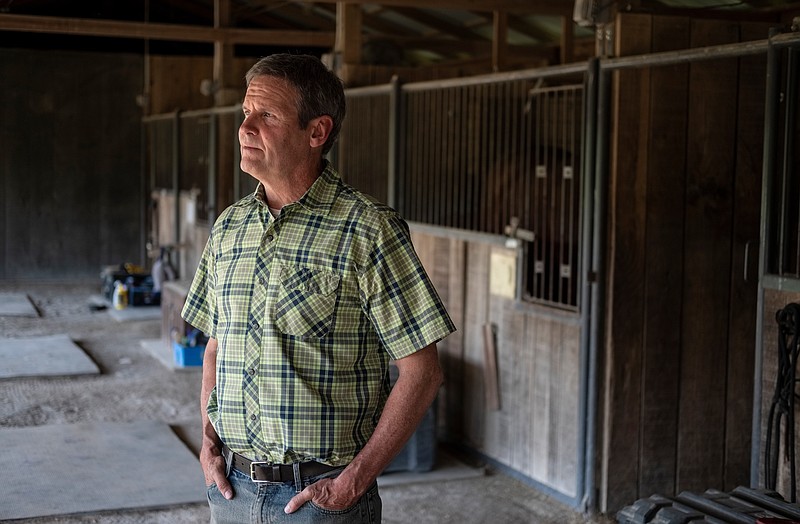Every day, Tennesseans return from their mailboxes with a strong desire to wash their hands.
In all likelihood, they've just handled several pieces of campaign mail from various candidates detailing how horrible their opponent or opponents would be, and how unqualified they are, for the office in question. When they turn on their televisions, they see the same thing.
Third-party players started the war in the Republican primary for Tennessee governor in earnest in late May, and two of the candidates joined in a month later. Now with early voting underway and Election Day less than two weeks away, the mail is a daily barrage, and the gubernatorial candidates are not the only ones playing.
The problem is, as former U.S. Rep. Zach Wamp noted in his gubernatorial endorsement of Republican Bill Lee - who has stated he would not resort to negative campaigning - all the gubernatorial candidates, Republicans and Democrats, are good people. In other words, their negative attacks are not who they are. But how are voters to know, based on what they see filling their mailboxes?
The political action committee (PAC) that started it all in May accused U.S. Rep. Diane Black, R-Gallatin, of voting for giving Tennessee driver's licenses to illegal immigrants and against funding of President Donald Trump's border wall.
Black, as a state representative, had, in fact, voted for legislation suggested by then-Republican Gov. Don Sundquist, who was last in office in January 2003, that was put forth to be sure illegal immigrants at least knew how to drive. The legislation later was repealed, and Black voted for that, too.
As for voting against the wall, she voted against a bill to keep the government operating, and the bill did contain funding for border security, but not a wall. But this is common behavior among members of Congress - voting for or against something for the whole of the bill, not for a specific aspect of it that they may support or oppose.
The third-party charge, from a PAC started by a supporter of Knoxville businessman Randy Boyd, may have been in retaliation for a Black news release last October alleging Boyd was "trying to run from his record" and that he supported illegal immigration.
In the last few weeks, though, the back-and-forths between the two have escalated.
' Boyd: Black mocked Trump's idea for a border wall, saying, "You can't build a wall. That won't work. It can't be done."
' Black: Boyd gave $250,000 to an organization that supports illegal immigration, sanctuary cities, weak borders and amnesty.
' Boyd: Diane Black is an original "never Trumper."
' Black: Randy "Never Trump" Boyd [is] "weak on illegal immigration."
The fact is both are likely to support Trump whenever it is expedient to do so, and both likely would support any state laws that bolster any federal laws against illegal immigration.
The recent surge in the race of Lee, who this page supports for governor, now has prompted Black and Boyd to attack the Franklin businessman and farmer.
Black called him a "moderate" and said he is "the kind of Republican who helps Democrats get elected." Similarly, Boyd said he "donated heavily to Democrats Phil Bredesen, Karl Dean and disgraced [Nashville] Mayor Megan Barry, who tried to turn Nashville into a sanctuary city and destination for refugees."
Lee, in fact, like many business people, contributed to candidates in both parties. He did give $1,000 to Bredesen (in a run for governor), $500 to Barry (in a run for Nashville mayor) and $250 to Dean (in a run for Nashville mayor), but from 1999 through 2017 Republicans got 99.27 percent of the $163,340 political contributions he made. Some "heavy" Democratic donor.
Meanwhile, Black admittedly voted for Democrats in at least two 1990s presidential races, and Boyd gave at least $250 to Knoxville Democratic Mayor Madeline Rogero.
Half-truths, specific votes and campaign contributions rarely tell the whole story. However, the insistence on negative campaigning might.
The battle for the Republican nomination for the open District 30 state House seat has seen similar allegations. Jonathan Mason and Esther Helton tout "a lifetime of defending conservative values" and a "proven conservative" record, respectively, for a seat that has not been held by a Democrat since the 1980s.
In fact, this is Mason's first run for office, and Helton has been an East Ridge city councilwoman for less than two years. Neither can accurately cite much more than their previous voting records. And that's where the rub has come.
Helton has not denied she voted for Democrats in the 2008 and 2012 presidential cycles, but she says she is certified as a "bona fide" Republican by the Tennessee Republican Party and the Hamilton County GOP. Mason says he is a "life-long Republican," "voted against Obama-era policies" and "never voted or supported candidates with a liberal agenda."
While this page has endorsed Mason and while past voting records have some significance, we believe either would be a reliable Republican vote in the legislature. As in the gubernatorial primary, though, we would prefer voters look closely at the statements the candidates make, examine them for truthfulness, and determine whether the candidate has a reasonable chance of accomplishing what he or she says.
An educated voter, after all, is always a better voter.
